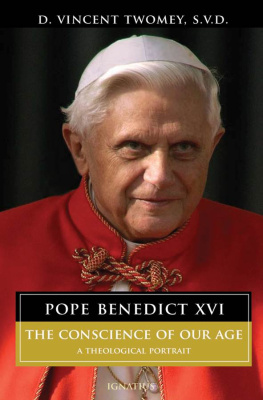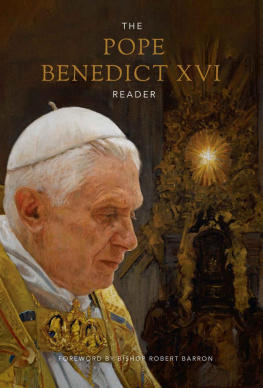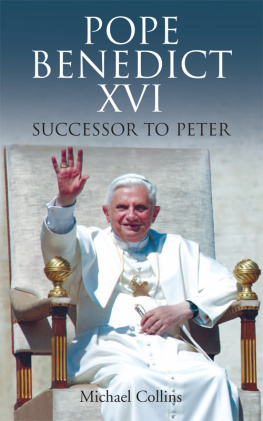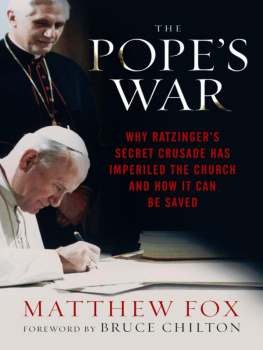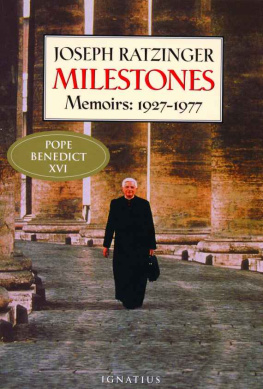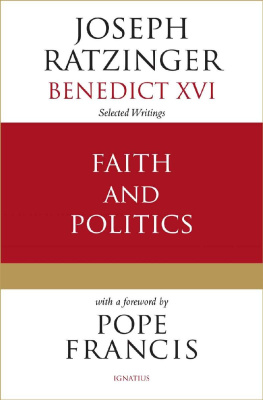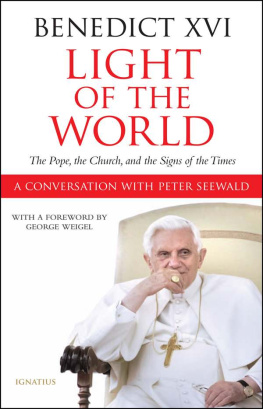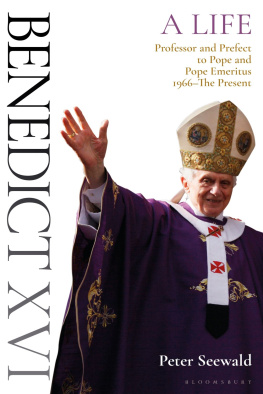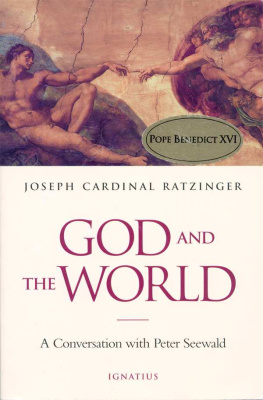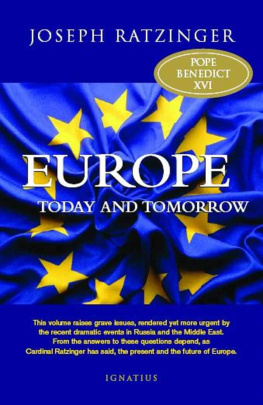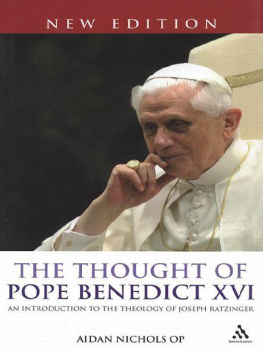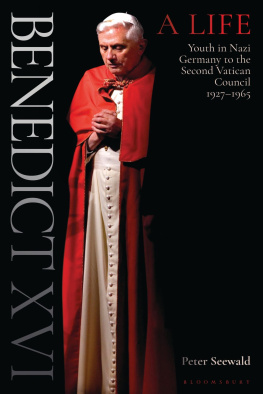POPE BENEDICT XVI
The Conscience of Our Age
POPE BENEDICT XVI
The Conscience of Our Age
A Theological Portrait
by
D. Vincent Twomey, S.V.D.
IGNATIUS PRESS SAN FRANCISCO
Sermon by Pope Benedict XVI
Castel Gandolfo, September 4, 2005
Libreria Editrice Vaticana
English translation by Martin Henry
All rights
reserved Used with permission
Cover photograph of Pope Benedict XVI
by Stephano Spaziani
Cover design by Roxanne Mei Lum
2007 by Ignatius Press, San Francisco
All rights reserved
ISBN 978-1-58617-170-4
Library of Congress Control Number 2006924093
Printed in the United States of America
The least power of love is already greater than the greatest power of destruction.
Salt of the Earth
And as a result [of living through the Nazi period], I learned to have a certain reserve with regard to the reigning ideologies.
Interview, 1993
My real program of governance is not to do my own will, not to pursue my own ideas, but to listen, together with the whole Church, to the word and the will of the Lord, to be guided by him, so that he himself will lead the Church at this hour of our history.
Homily at the Inauguration Mass on April 24, 2005
CONTENTS
The Courage to Be Imperfect
The Conscience of the Teacher
1. The university seminar
2. The doctoral colloquium
3. The lecturer
4. The interaction of scholarship and contemporary events
5. Scholarship and Magisterium
Ratzingers Writings: An Overview
1. Ratzingers theological methodology
2. Some major characteristics
3. Liberal or conservative?
4. Foundational research
5. The early period
6. The middle period
7. The later period
8. Major interviews
9. Moral theology and the theology of political life
10. The first encyclical
The Role of Conscience in Theology
1. Freedom and authority
2. Conscience and Church authority
a. Conscience in the exercise of episcopal authority
b. Conscience in the exercise of papal authority
c. Conscience vis--vis the Churchs authoritative decisions
d. The conscience of the theologian and that of the Magisterium
The Role of Conscience in Politics
1. Conscience, truth, and the limits of political authority
2. The relationship between political power and conscience
3. Democracy, the Church, and conscience
a. Democracy under threat
b. Dangers to democracy posed by Christianity
c. The central question
What Is Conscience?
1. The primal level of conscience
2. Conscience as judgment
3. Conscience and the objective moral law
4. Conscience and other religions
5. Conclusion
A Critique
The German Pope: Guilt by Association
The Future under Pope Benedict XVI
A Question of Fairness: Critique of a Biography
Sermon by Pope Benedict XVI
INTRODUCTION
THE COURAGE TO BE IMPERFECT
Walking the streets of Rome the day before Pope Benedict XVIs Inauguration Mass, have devoted their research to the origins and nature of the primacy of the Bishop of Rome in the universal Church, which is one of the chief stumbling blocks for separated Christians, in fact the only really substantial obstacle to union with the Orthodox Churches.
It was only in the course of the various celebrations marking his inauguration as successor of Saint Peter that I slowly came to terms with the transformation of my former teacher, an eminent but essentially humble German professor, into the Universal Pastor of the Church, now the focus of the worlds attention, thanks in no small way to the modern mass media. The somewhat retiring academic I had once known had become an exuberant pastor, responding with gestures we his former students had never seen before, such as waving hands and kissing babies.
While I was in Rome, the main topic of conversation was the person of the new Pope. Everyone wanted to know: What kind of a person is he? Those who had only known the new Pope as the Cardinal Prefect of the Congregation for the Doctrine of the Faith had a decidedly negative image, one largely created not only by a largely hostile media but also by the nature of his office as Cardinal Prefect responsible for the integrity of the faith. That image did not match the reality they now saw on their TV screens, and so they asked: What is he really like? His former grim image was strikingly at variance with the smiling new Pope, who had evidently captured the hearts of the Romans and who was already causing journalists from around the world to question their own creation.
When we, his former students, some of whom had known him for forty-five years, got together in private, we allowed ourselves the luxury of fondand not so fondreminiscences. Over lunches that lasted well into the afternoon, we recalled the halcyon days when we were his postgraduate or postdoctoral students. The atmosphere in Rome was comparable to that of a wedding banquet: we tried to accustom ourselvesnot without an occasional tear and much laughterto the sudden change of our much beloved teacher into the Holy Father, who was now exciting the world as he had once inspired his students in Regensburg. In truth, we could hardly contain our joy or adequately express our surprise at the fact that our former teacher had become the successor of Saint Peter as Bishop of Rome, whose main task would be to nourish the faith and strengthen the brethren, his fellow bishops and all fellow Christians, in our common mission and responsibility to bring Christ to mankind and lead mankind to Christ.
The world at last, we felt, had the opportunity to encounter the charming personality, intellectual brilliance, and pastoral heart of the man we his former students knew so well. This encounter was made possible by journalists, the very people, paradoxically, who had been largely responsible for his negative image as Grand Inquisitor, Panzerkardinal (the iron-clad cardinal), and enforcer of the faith (John L. Allen, Jr.). Incidentally, at an audience of some five thousand journalists and their relatives the day before his induction, Benedict XVI thanked them for making it possible for the world to participate in the recent death of the Pope and the election of a successor, often at great personal cost to themselves and their families. It was the first time they had been thanked by a pope, one hardened journalist told me, and they were deeply moved.
We, his former students, recalled the days when he was a professor in Bonn, Munster, Tubingen, and, especially, Regensburg. We were displeased by the recent attempt to blacken his image by distorting the truth about his youth at a time when Germany was under the total control of Hitler. (He and his family were intensely anti-Nazi.) And we speculated about the future, about what he might do, in the light of what we knew of his own personality and, more importantly, of his great mind and extraordinary memory.
Pope Benedict XVI will teach the world not only by what he says but also by example. The simple dignity of the Requiem for Pope John Paul II and the sheer beauty of his own Inauguration Mass gave those present a touch of heaven on earthand entranced those who followed it on television. As I remarked to a Dublin diocesan priest, now studying liturgy in Rome, who sat near me at the Mass: Benedict XVI was giving the world his first lesson in liturgy. He has written extensively on liturgy, but his writings have generally been ignoredeven kept off the shelves of at least one institute set up for the study of liturgy, as I happen to know. Now, it is hoped, people will finally read him.
This, I suspect, will be his teaching methodfirst to win the hearts of people, who will then read for themselves what he has written on a particular topic. He has written on almost every theological subject touching on the faith, morality, and Church and State. The latest bibliography of his publications (up to 2002) covers some seventy-nine pages. for, as few people realize, he continued to publish as a private theologian while Prefect of the Congregation for the Doctrine of the Faith.
Next page
